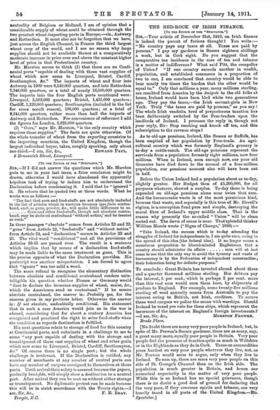THE BED-ROCK OF IRISH FINANCE.
[To Tim EDITOR 01 TUB " SPECTATOR:1 SIR,—Your article of December 31st, 1910, on Irish finance is indeed the parent of furious thought I You write :- " No country pays any taxes at all. Taxes are paid by persons." I pay my gardener in Sussex eighteen shillings a week, but in Cork eight. Do you suggest that the comparative tax incidence in the case of tea and tobacco is a matter of indifference ? What said Pitt, the compeller of Union ? "If one country exceeds another in wealth, population, and established commerce in a proportion of two to one, I am convinced that country would be able to bear nearly ten times the burden that the other would be equal to." Only that millions a. year, many millions sterling, are remitted from America by the entigrls to the old folks at home, Ireland would have been bled white two generations ago. They pay the taxes,—the Irish servant-girls in New York. Truly "the taxes are paid by persons," as you say The whole Irish vendetta bred of preposterous taxation has been deliberately switched by the Free-traders upon the landlords of Ireland. I presume the reply is, though not your reply, Sir: Stop smoking and knock off tea, and this subscription to the revenue stops I
As to old-age pensions, Ireland, like Sussex or Suffolk, has been emptied of her population by Free-trade. An agri- cultural country which was formerly England's granary is to-day a cattle-ranch. The old-age pensions represent the survivals from a population formerly eight millions, now four millions. When in Ireland, soon enough now, our poor old Grannies have died down to the normal of a four-million population, our pensions account also will have been cut in half.
Before the Union Ireland had a population about as to-day, slightly greater. Her Budget then of 21,300,000, for all purposes whatever, showed a surplus. To-day there is being expended on old-age pensions alone near twice that sum. And the bureaucratic waste is of the most pernicious kind, because that waste, and especially is this true of Mr. Birrell's regime, is a corruption fund pure and simple, destroying the moral fibre of Ireland's upper middle class. That is the reason why presently the so-called " Union" will be clean rooted out. The dawn of sense is near. That splendid thinker William Morris wrote (" Signs of Change," 1888) :—
" Take Ireland, the success which is to-day attending the struggles of Ireland for independence is, I am quite sure, owing to the spread of this idea [the federal ideal. It no longer seems a monstrous proposition to liberal-minded Englishmen that a
country should administer its affairs men will at last come to see that the only way to avoid the tyranny and waste of bureaucracy is by the Federation of independent communities ; their federation being for definite purposes."
To conclude : Great Britain has invested abroad about three and a quarter thousand millions sterling. Her debtors pay the interest, 5 per cent., which is perhaps 2 per cent. more than this vast sum would earn them here, by shipments of produce to England. For example, some twenty-five millions sterling of wool annually comes from Australia to pay the interest owing to British, not Irish, creditors. To secure these wool cargoes we police the ocean with warships. Should Ireland be taxed pro rata for these ships, which represent the insurance of the interest on lhigland's foreign investments ?
[No doubt there are many very poor people in Ireland; but, in spite of Mr. Frewen's Sussex gardener, there are as many, nay, a great many more, equally poor people in Britain. Very poor people feel the pressure of taxation quite as much in Wiltshire or in the Highlands as they do in Cork. Taxes on commodities press hardest on very poor people wherever they live, not, as Mr. Frewen would seem to argue, only when they live in Ireland. To sum up, there are more very poor people on this side of St. George's Channel than on the Irish side. The population is much greater in Britain, and hence our numerical superiority in the matter of very poor people. While this is so Ireland has no special grievance, though there is no doubt a good deal of ground for declaring that the very poor, if they consume spirits and tobacco, are -very heavily taxed in all parts of the United Kingdom.—En. Spectator.]






































 Previous page
Previous page